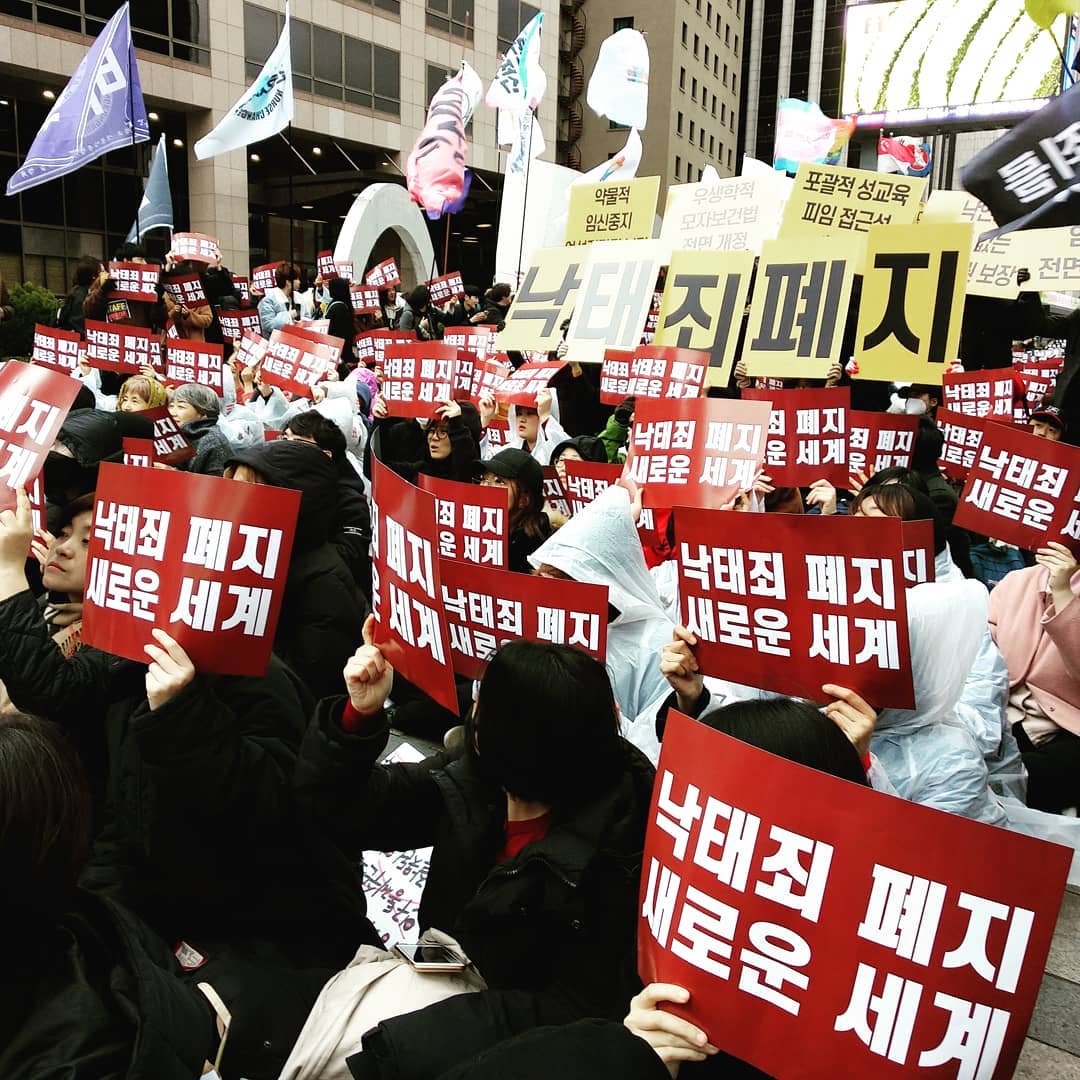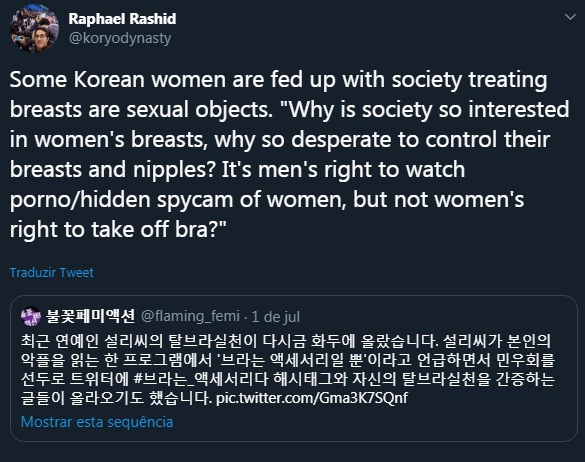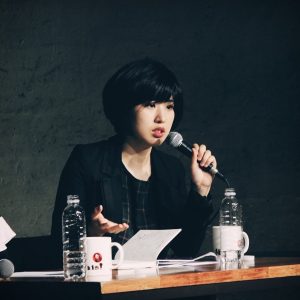K-Pop fans often discuss about the sexism in Korea. But do we even know what we’re talking about? What exactly is the reality experienced by Korean women?
Author’s note: This article’s Idea came up to me when I got to know FFA’s work through a Nipple Free demonstration they did After Sulli’s participation on Night of Hate Comments, where she shared her opinion about all the malicious comments she was getting just because of her choice on not wearing bras. It’s extremely sad to perceive that, while I was working on this, she passed away. But her example as a strong and unwavering woman stands. We hope that other idols can make the most of their influence and raise some flags and awareness about serious issues. But first of all we hope that women, in and out of this industry, can feel safe to live and defend their ideas.
[su_divider top=”no” style=”dotted” divider_color=”#f87f9d” size=”1″]In 2016 South Korea was marked by major event. In addition from the demonstrations demanding the resignation of former president Park GeunHye, the country also faced a brutal crime: the Gangnam Station murder case. Led by his hate for women, a Men called Kim SeongMin stabbed to death a young woman he had never seen before. According to the murderer himself, his motive lied on the fact that women had humiliated and ignored him through his life.
The crime itself was enough reason to enrage people but the trial – which claimed only mental illness as motivation, and ignored killer’s misogynistic reasons – further boosted the popular movement against the Injustice of the case, specially among South Korean women. Amid the protests and in this environment of indignation towards society and justice, discussions about women’s rights and security were reignited, increasing the voice of the so called Reboot Feminism, which was being shaped since 2015.
Groups like Famerz was born in those days but Flaming Feminist Action, which received a lot of attention due to their nipple free protest, was already active and went through changes after the Gangnam case. “In order to resist, we held a press conference and formed an organization. Later on we recruited feminist members. The organization is made up by activists who design the actions and projects, and members who take part in the action together”, the group explains.
In addition to becoming an unfortunate milestone in the history of the movement, the Gangnam murder case also changed the way women perceive themselves in a society where, in 2016 alone, they were the victims of over 80% of the brutal crimes (murder, assault, rape and arson) reported in the country. The data, revealed by the Korean Women Development Institute (KWDI), also points to the growth of these numbers in 2017, when out of 36K reported brutal crime cases, women were the victims on 30,4K.
Aside from the registered crimes, there’s also the incidence of unreported crimes and the consequence of this set: an insecurity wave that washes all the surroundings. According to Flaming Feminist Action, the daily life of Korean women is immersed in a reality of fear and anxiety: “The anxiety that someone may be filming me at the toilet, that the one I love the most may become the one who actually hurts me the most – not only mentally but also physically -, and the one [anxiety] that this route to my home today may be the last walk that I take. These anxieties rob our time, our freedom,” confides the activist group.
The spy cam epidemic
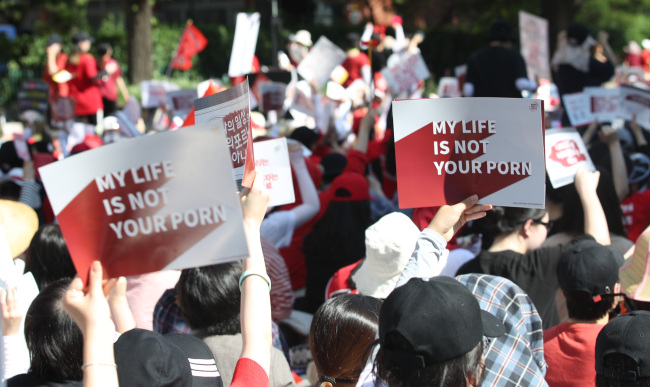
Demonstrations against spy cameras in Hyehwa led more than 20K women to the streets @ cr: Yonhap station
Despite the Hyehwa demonstrations, in 2018, and the cases involving idols, in 2019, the criminal practice has been impregnating Korean habits since the early 2000s, when the publishing of these illegal images grew within the SoraNet. The website used to be one of the largest domains of pornographic content in the country, and its high concentration of filming and/or illegally disseminated footage has helped to blur the line between pornography and online sex crime, that prevails until today.
This diffuse relationship between those cases and the pornograpghy reflects directly on the high rates of digital sexual crimes. Not only for its consumption, but also for the profit that this consumption provides. In march of this year, for example, four men were arrested for broadcasting live spy cam footage from hotel rooms of 30 facilities across the country. It is estimated that in this case alone, over 1,6K people were victims, and 4K people accessed the content, some of them paying for exclusive tools such as the replaying of certain contents. But the numbers of this kind of crime goes far beyond. According to the Korean justice statistics, between 2007 and 2015, the reported spy cam cases jolted from 564 to 7,7K – since then, the registers fell to 5,2K in 2016 and increased again in 2018 – with a total of 6,6K cases.
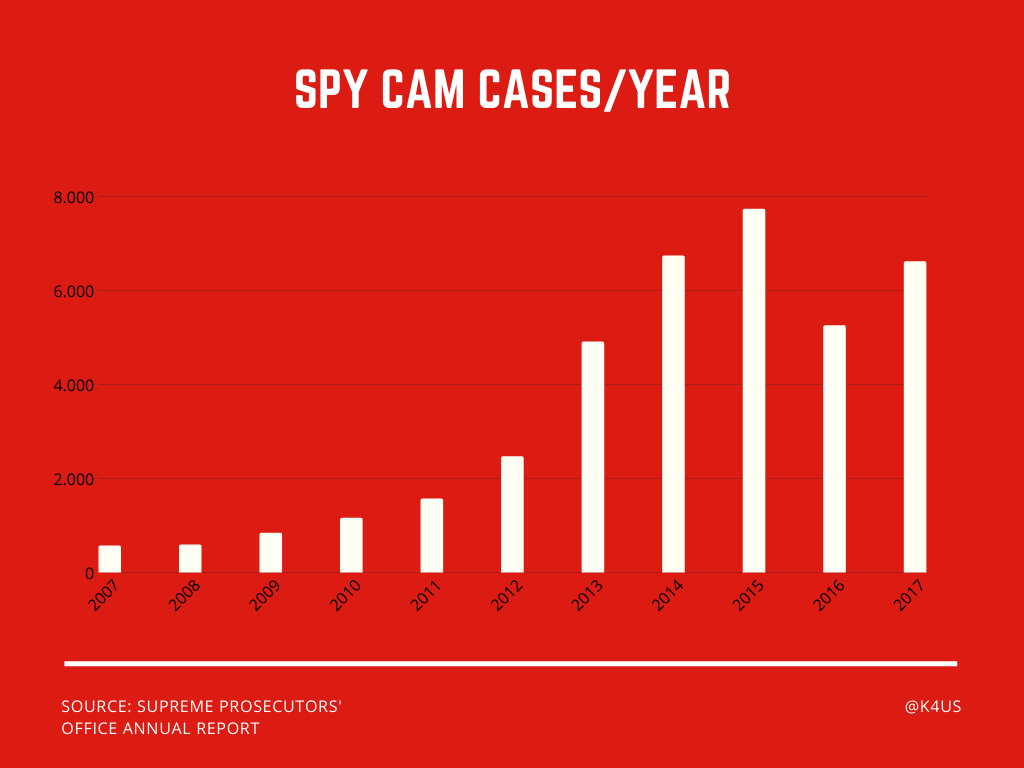
Between 2007 and 2017, 38,900 spy cam cases were reported. The peak occurred in 2015, which summed up 7,7K registered cases.
According to the group, the rape culture and its ceaseless blaming of the victim doesn’t allow men to understand the leaking of footage and other digital sexual crimes as crimes, which turns the experience a “game or play of naughty and frank boys or men” – in the words of the activists. The group believes that the digital sexual crime situation also speaks a lot about the modernization of only some aspects of the society: “Korea has achieved a rapid improvement of economy and technology, however, civic awareness (citizenship), feelings over law, sensitivity of human rights and gender equality have not been developed and changed according to the speed of the improvement”, contextualize the DSO’s members.
Idols and online feminist concentration
This whole scenery points to a behavior rooted in the society – especially among men -, which was reinforced this year, by the disclosure of cases that revealed several idols involvement on sharing illegal footages. “It would be much more appropriate to use the word ‘deplorable’, or ‘furious’ than to say just ‘we are shocked’ [about the case]”, says DSO.
The lack of resolution or toughness on the treating of the cases wasn’t a surprise for Flaming Feminist Action either: “The public’s shock and anger cannot lead to immediate punishment unless consciousness is shifted, with those in power, including the police and the court, whom currently either accomplices with the perpetrator or are more sympathetic to the perpetrator. Since the powerful people of Korean society are closely connected, as seen at the recent events, it will be necessary for the ordinary people to raise a continuous voice to make it ‘problematic issues’”, they explain.
Even concentrating a large number of crimes against women, the online space is widely occupied by feminist groups and expressions. “We unite through online and see each other offline. Online and offline doesn’t really matter when making a difference”, explains Lee MinKyung, the “We Need Language” author, one of Korea’s best-selling books about feminism.
- We Need Language, one of the best selling titles of its kind in Korea
- Author Lee MinKyung during a lecture
Aside from fixing offline meetings and fighting online misogyny, many groups use the internet to spread knowledge. MinKyung’s book, for example, was part of the responsibles for the 178% increase in sales of books about female and gender studies in 2016, and still is among the list of reading recommendations on feminist profiles on instagram – the social media collects posts with different recommendations. “We tend to find informations through reading. We easily think of a book as an approach to a new issue,” explains the author.
Sharing space with books, the hashtags related to Korean feminism on social networks are also composed by many webtoon-like illustrations, a highly expressive narrative genre within the country.
Radical feminism stigma
In a worldwide scale, the radical feminism already carries different stigmas regarding, especially, the intolerance to some minorities, and in Korea this is no different. One case that got a lot of attention, and only reinforced the bad impression of this side of the movement, happened in 2017 – when an allegedly radical feminist published, on the Megalia forum, a statement encouraging pedophilia aimed to young boys.
Even though the forum was concentration point to the movements against SoraNet and other spy cam cases in 2015, Megalia ended up inheriting the reputation of its members. Involved in a large number of controversies – ranging from posting mutilated penises images to exposing gay men who are married to women -, the forum was compared to Ilbe, a forum filled with far-right wing young men and posts encouraging violence against women.
According to the activists of Flaming Feminist Action, the radical feminist who spread dangerous ideas against young men are a mirror to the women’s objectification culture, cultivated by the male population and found especially in forums like the Ilbe. DSO also says that “In Korea, all generation of men are committing violence against all generation of women. Instead of spending time caring for the predators, Korean radical feminists advocate and represent the victim’s rights and provide them with the language for fight.”
Flaming Feminist Action also points to the fact that this part of the feminist movement isn’t formed only by women with criminal reasons: “there are feminists who express hatred toward other minorities. However, we can’t say that they are the majority of Korean radical feminists. The things that are mentioned as ‘minority hatred’ have a context that it was made. Radical feminists tried to point out and criticize not the whole sexual minorities but the misogyny in gay culture,” they explained.
Digital generation, educational system role and the feminism future
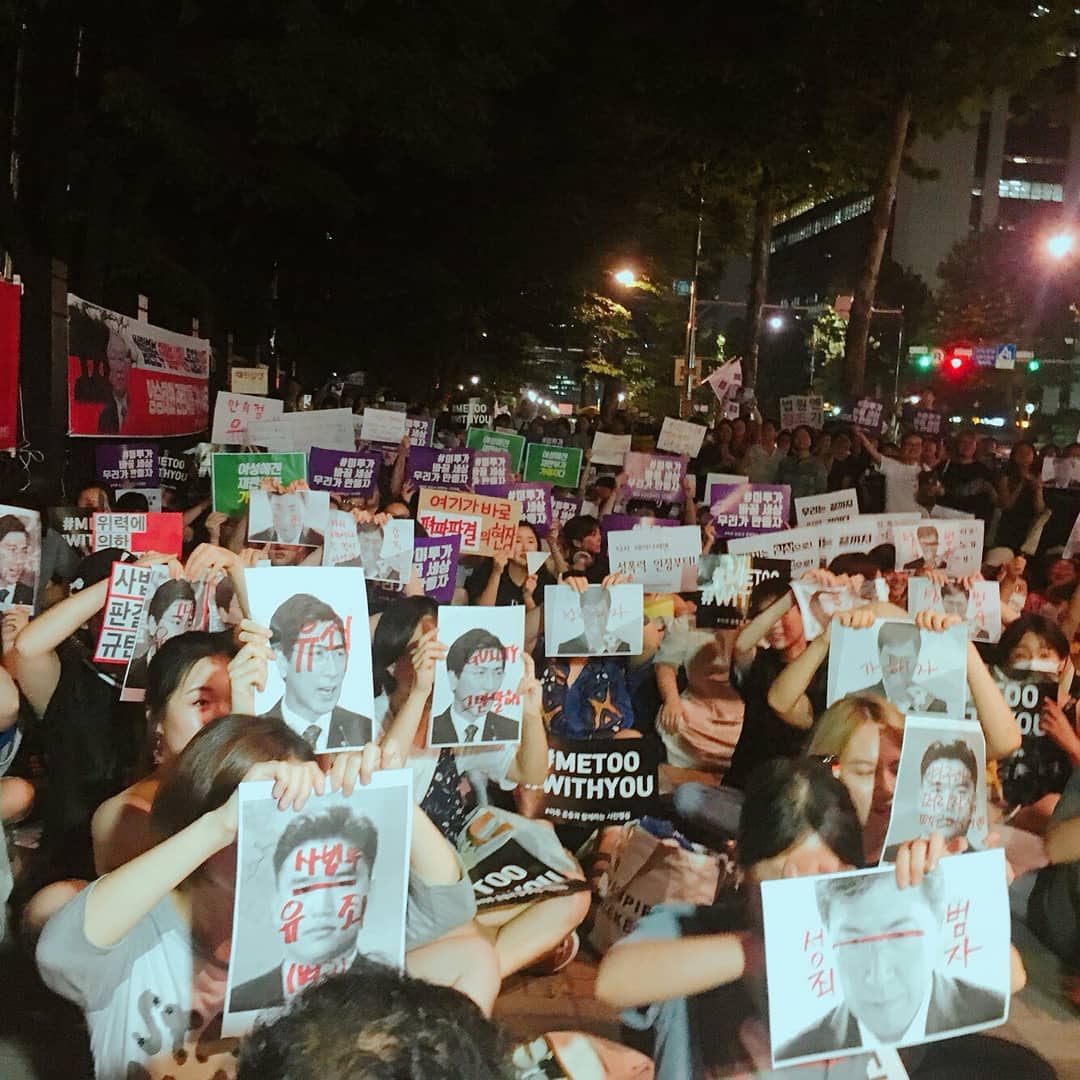
Protests against the politician Ahn HeeJung, accused of harassment by the #metoo movement
Even with a world of available infos on the online networks, the first contact with feminism for a good parcel of the women between their 20s and 30s, happened after their teenage days. The “late” contact, though, didn’t stopped them from joining the fight for equality. According to a survey by KWDI – to understand the perspective on feminism among young people in their 20s -, almost 80% of the participating women recognize the seriousness of gender stereotypes and discrimination against women. Among the male participants, the result was tough: 42,6% agree with the majority of the women while 55,2% oppose to them and doesn’t think this is a serious problem.
To our interviewees, one of the solutions, that might help both men and women from reproducing sexist speeches and actions, lies on the classroom. “I truly believe that gender equality should be included in educational system. Individuals had done great work, but they are now temporarily replacing institutional work, but it can’t be maintained forever,” tells MinKyung. Flaming Feminist Action activists further explain that unless you grow up in a different environment, contact with the idea of equality becomes difficult. “The next generation, including both women and men, should be officially educated that the feminism is the movement to correct the unfairness and understand its legitimacy,” says DSO in agreement.
“The girls today are encountering the word ‘feminism’, unlike myself, but I am sure they often feel hostility from men and the world,” tells one of DSO’s activists about the difference between these generations who are growing up among online and offline. And if the current moment of feminism already defines itself as of a digital nature, the next phase might present that naturalness in a even more expressive and natural way. Unless the rising waves of conservatism grow stronger in the country, the tendency for future generations is to add to the new discourses the knowledge, the experiences and achievements of previous struggles carried out by the feminist movement – from Yu GwanSun to Feminism Reboot.
K4US Team is very thankful for Flaming Feminist Action,
Digital Sexual Crime Out groups and author Lee MinKyung’s
collaboration. They have been completely dedicated to
answering our questions and sharing their
perspectives with the Brazilian public.
Interview and article by Bea @ K4US writing team
Don’t remove without credits
www.K4US.com.br
 Português
Português English
English 한국어
한국어